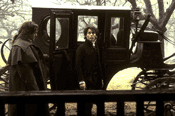
![]()
Purely for information's sake, you should know that Toy Story 2 is now showing at cinemas all over this glorious city. The original was a box office smash, not to mention a technical milestone, and the sequel promises to be all that and more. But less so. However, as you've probably realized by now, I don't do animated features (at least those intended for children). This rule is not subject to debate.
Now I can clearly remember a time when Tim Burton was real kewl. Which is funny, because I'm not even entirely sure what "kewl" means. I'm not sure exactly when Burton stopped being so damn "kewl," but I do know that the term of his "kewlness" coincided with Winona Ryder's reign as a Hollywood hottie. To think that now she's nothing more than a butt for South Park jokes (although it's her pussy they were joking about). And Burton doesn't even merit that. Brian Boitano gets like three gags an episode; Tim Burton gets squat.
So you'll forgive me if I'm rather less excited about Burton's loose adaptation of the apparently widely read but barely remembered Washington Irving story "The Legend of Sleepy Hollow." Indeed, SLEEPY HOLLOW has Johnny Depp wearing expensive vintage thrift-store clothes and making odd faces, the
 |
Far be it from me to scold Burton for playing it fast and loose with his adaptation of the Irving story, or even for conditioning Ichabod Crane's psyche on one of those early childhood traumas in the absence of which no Tim Burton film would appear to be possible. For one thing, Irving isn't really much of a writer, his copious alliterations and vaguely sexual double entendres placing him professionally somewhere between a Hollywood scene reporter and your average Moscow hack (not that there's a great difference, really).
Nevertheless, one still wonders why Burton of all people would neglect to even broach the one issue that will inevitably be on everyone's mind where such an adaptation is concerned: Was the Bard of the Hudson River Valley in fact gay? For many, of course, this is no more subject to doubt than the sexualities of, say, George Michael, Michael Stipe, or that one Teletubby (or is it Teletubbie?). Consider, for example, that in this one barely 30-page short story alone, Irving uses the word "cock" six times (once in the plural even, which should perhaps count at least double). Which might not seem like a lot until you consider that he was writing in the early 19th century in Puritanical New England, where the inadvertent public exposure of a bare ankle could lead to ritual public burning on suspicion of any of the vaguely allied crimes falling under the blanket term witchcraft.
Even a sampling of some of Irving's least bawdy prose leaves little doubt as to which team he would most like to hit for. And certainly Irving's stand-in character, Ichabod Crane, is no stranger to the attraction of other men, to say nothing of young Dutch boys ("he administered justice with discrimination rather than severity… inflicting a double portion on some little tough wrong headed, broad-skirted Dutch urchin, who sulked and swelled and grew dogged and sullen... All this he called 'doing his duty by their parents'"). And of course, "when school hours were over, he was even the companion and playmate of the larger boys; and on holiday afternoons would convoy some of the smaller ones home... Indeed, it behooved him to keep on good terms with his pupils." Or even his habit of "carrying the whole budget of local gossip from house to house." Lest there still be any doubt, simply consider Ichabod's fondness for that "golden maxim, 'Spare the rod and spoil the child.'"
Nor can we reasonably ignore the suggestive description of the village of Sleepy Hollow itself: "From the listless repose of the place, and the peculiar character of its inhabitants, who are descendants from the original Dutch settlers, this sequestered glen has long been known by the name of Sleepy
 |
Finally, there is the mockingly alliterative name of the "commander-in-chief" of spirits haunting this "enchanted region": the Headless Horseman of Sleepy Hollow (or alternately, the Galloping Horseman of the Hollow). Any more deviantly phallic and the mysterious "Hessian" would be a background set decoration from Wagner's "Ring" cycle.
(No doubt it is indicative of the area's inherent confusion with respect to identity and sexuality, that the real life Sleepy Hollow - the village of Tarrytown, New York - long held out against the obvious financial benefits to be gained from assuming the fictional name attributed to it by perhaps not-so-favorite-son Irving, finally accepting the name change to Sleepy Hollow only in 1986, long after it might have been possible to take any real tourist-related advantage of the moniker. And no doubt the locals are long since good and tired of the local "legend," so if you ever find yourself in the vicinity be sure to pester them about it, endlessly.)
And yet, Burton has ignored all of this rich subtext to stage his version of SLEEPY HOLLOW as a simply morality tale, with a sprinkling of witchcraft and anachronistic psychotherapy. Presumably he knows what he's doing; after all, he has been in Hollywood for quite some time now.
In closing, I will allow that I did laugh out loud in response to Christopher Walken's non-speaking role as the eternally screaming Hessian (so much anger in him) with very bad teeth (pre-decapitation, it goes without saying). Not quite as loud as I had expected to, however. I guess we're all getting a little bit older.
Cards |
Links |
The Vault |
Gallery |
Who? |

